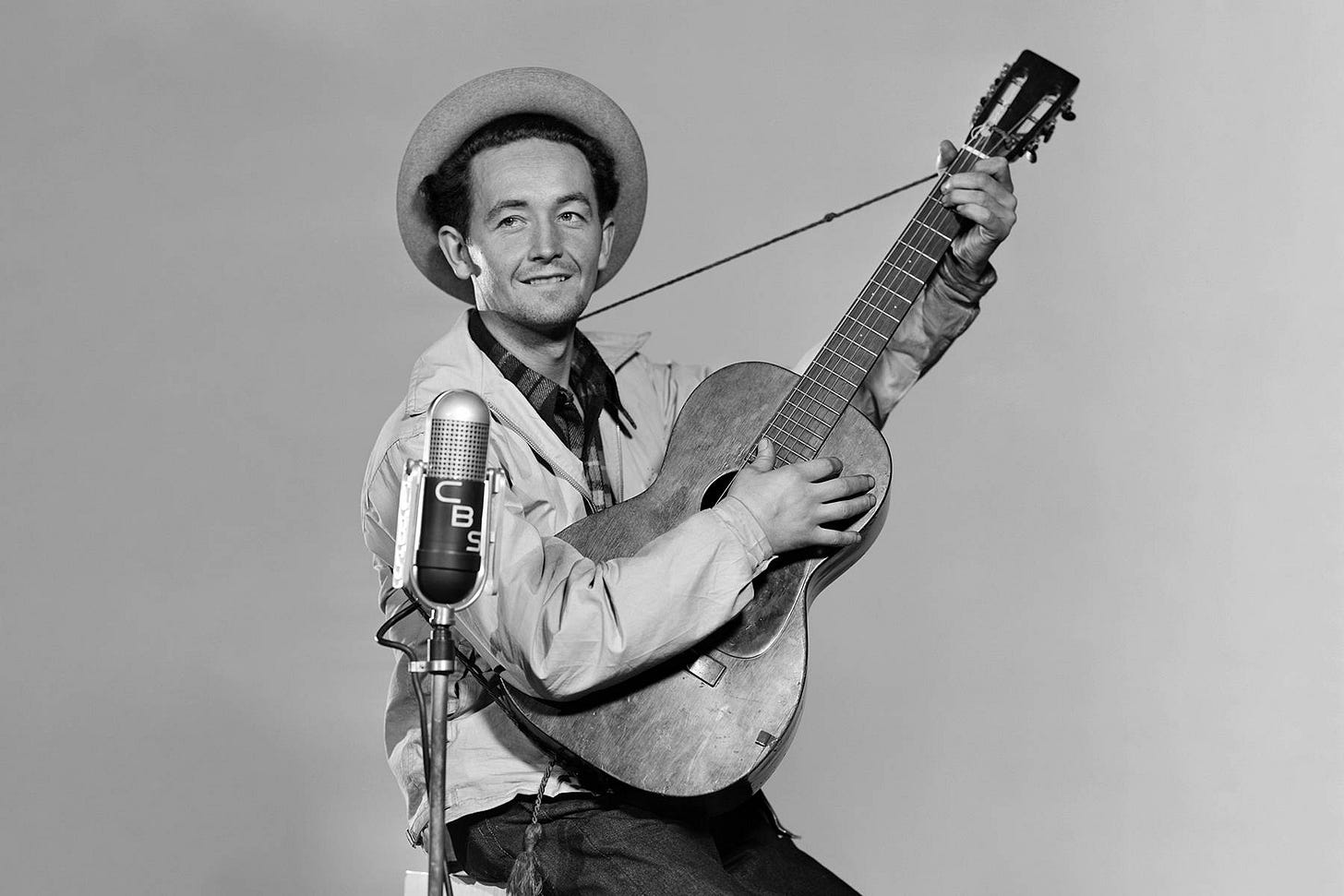Oh, No! Did I miss Woody Guthrie’s birthday? There's always a gale of social media genuflection accompanying the July 14 anniversary of his birth, and the scope of its obsequious, reflexive veneration is reliably sickening. “American treasure!” Folk trailblazer!” Guthrie's story has been thoroughly mythologized, whitewashed and sanitized in a deliberate, overheated attempt to permanently install him as a working-class crusader and ideological wonderboy.
For starters, few know that his father Charley Guthrie was an upper-middle class Okehma, OK, conservative pol, land speculator and a full on, straight up Ku Klux Klansman—a known rapist and lynching participant. Setting that aside (if we must), Woody, then, learned to sing and play guitar not around a migrant labor camp fire but by imitating blues records in the comfort of his bougie bedroom. Throw in Woody’s own, very nasty racism, serial prevarication and (surprise, surprise, Gomer!) worshipful regard for Josef Stalin and it all combines to reveal the fact that his public self was entirely fake—a political minstrel show.
His reputation as a selfless crusader, outspoken Everyman and indefatigable defender of the little guy is an easily punctured myth; one only need examine his innumerable biographies (referenced with footnotes below).
Guthrie always said he learned to play harmonica from a local African-American street performer named George, who kindly mentored him. That was a lie. Years later, he recanted, admitting he learned from a neighborhood peer, and that the bluesman never existed.*
Then there was the fact that Guthrie claimed joining the Communist party was the best thing he'd ever done, but, according to the FBI, he never actually became a card-carrying member.**
His famous “This Machine Kills Fascists” slogan on his guitar? Turns out that was a morale-boosting WWII government slogan printed on stickers that were handed out to defense plant workers — capitalist propaganda, if you will.
Then there's the fact that whenever Guthrie's sociopolitical stance became unpopular, he tended to switch course to a previously opposed viewpoint. He derided FDR as Churchill's lapdog and aspiring war profiteer, and sold the Communist pitch that WWII was “capitalist fraud.” When that position became untenable, Guthrie transmogrified into a staunch, patriotic Roosevelt and war supporter, slanting his lyrics toward flag-waving anti-fascism, beginning with “Reuben James.”
Guthrie cheered Joseph Stalin long and loud, defending the Reds' invasion of Poland. (one starry-eyed biographer found the extent and duration of Guthrie's pro-Stalin stance “shocking.”)
But the most damning buried Guthrie biographical fact? That he was, just like his old man, a racist.
Having blacked up as a teenager in Okemah to perform a half-baked minstrel show, Guthrie, while living in Los Angeles’ Echo Park took time out from championing oppressed white Okies to doodle innumerable cartoons of what he described as “jungle blacks,” a group he also referred to as “niggers,” “darkies,” “chocolate drops” and, yes, “monkeys.”*
After encountering a group of African-Americans on Santa Monica Beach one day in 1937, Guthrie immortalized the meeting in a lengthy poem that included stanzas like, “What is that Ethiopian smell / upon the Zephyrs, what a fright!” and “We could dimly hear their chants / and we thought the blacks by chance / were doing a cannibal dance.”*
Broadcasting on Pasadena's KFVD, Guthrie often indulged in on-air employ of ebonics and was stunned when a black listener characterized the singer as “unintelligent” after hearing Guthrie perform songs with titles like “Run, Nigger, Run” and “Nigger Blues.” Fortunately for Guthrie, recordings of these tunes do not survive.
(Guthrie apologists are quick to point out that “nigger” was then in “common usage.” But it was pejorative then — and, ouch, racist — just as today.)
Later, Guthrie said, “A young Negro in Los Angeles wrote me a nice letter one day telling me the meaning of that word [nigger] and that I shouldn't say it anymore on the air. So I apologized.” He next “tore all the nigger songs out of his songbook.”***
“Told Woody the meaning of that word?” Horseshit.
After Stalin signed his Non-Aggression Pact with the Nazis in 1939, KFVD fired him—not for his nigger songs but for his ceaseless pro-Soviet Union chatter. He abandoned his wife and daughter in Texas and headed to Manhattan to play the part of The Oklahoma Cowboy, bang rich broads and party with the millionaire pinko set. Pete Seeger, visiting Texas with Woody, recalled a humiliating meeting with the mother-in-law who begged that talent-free banjoist to “persuade Guthrie to treat her daughter better.”
Guthrie’s worm-like employ of political expedience was as bad as Seegers and as egregious as his treatment of his family. Biographer Will Kaufman: “He wrote one song describing the Soviet invasion of Poland as a favor to Polish farmers, and another attacking President Roosevelt's loans to Finland to help it defend against the Soviet Union's invasion in 1939. His attitude switched again in 1941 after the Nazis invaded the Soviet Union.” ***** Whiplash inducing, ain’t it?
Guthrie was far from the simple, working-man's champion he's portrayed as. The full story is the full story, and glossing over the truth about him does the American people a grave disservice. Happy birthday, Scumbag.
*Prophet Singer: The Voice and Vision of Woody Guthrie by Mark Allan Jackson; p.138
**“There's a Better World a-Coming”: Resolving the Tension Between the Urban and Rural Visions in the Writings of Woody Guthrie by John Partington; see all of Ch 2
***Woody Guthrie: A Life by Joe Klein. p.410, pp.95-97
****Ramblin' Man: The Life and Times of Woody Guthrie by Ed Cray, p.188
***** See"Woody Guthrie's 'Union War'". Hungarian Journal of English and American Studies by Will Kaufman


